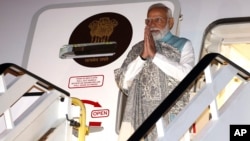Indian Prime Minister Narendra Modi has arrived in Australia for an official visit. Talks with the Australian government are expected to focus on defense, trade and renewable energy.
Modi last visited Australia in 2014. Much has changed in the bilateral relationship since then. Defense and security ties have become stronger. Last year, the two nations signed an interim trade deal. Formal negotiations on a full pact are expected to begin shortly.
About 20,000 people are expected at a rally Tuesday at Sydney Olympic Park for an address by Modi. His Australian counterpart, Anthony Albanese, also will attend as Australia approaches a milestone of 1 million people of Indian origin. Members of the Indian diaspora will travel from around Australia for the event.
A group of Greens party senators in Canberra have urged Albanese to raise human rights violations against minority groups in India during talks with Modi.
Activists have said that dozens of rights campaigners are in jail across India following politically motivated prosecutions. Indian government officials have had no response to the allegations so far.
Analysts believes there could also be protests at the Sydney rally against Modi by Muslim and Sikh activists.
Ian Hall, acting director of the Griffith Asia Institute at Queensland’s Griffith University, told VOA that geopolitical tensions in the Indo-Pacific region have intensified ties between Canberra and New Delhi.
“Look, China hangs over all of this. I think we would have seen Australia and India come together over time but that would have happened over [a] 30- or 40-year period,” Hall said. “What has accelerated this relationship and really catalyzed the relationship is the deterioration of relations with China and working together now in order to ensure some kind of balance of power and influence in the region has become this central driving force of the relationship between the two countries.”
Australia and India are members of the Quad security dialogue, an alliance that also includes Japan and the United States.
India is the world's largest democracy and has overtaken China as the most populous nation, according to the United Nations.
Albanese said relations between Canberra and New Delhi had never been closer.
India is Australia’s sixth-largest trading partner with two-way trade in goods and services valued at $30 billion in 2022, according to official government data.




